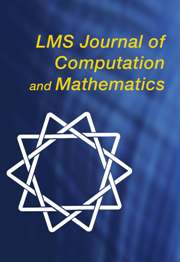Crossref Citations
This article has been cited by the following publications. This list is generated based on data provided by Crossref.
Cohen, H.
Diaz y Diaz, F.
and
Olivier, M.
1999.
Tables of octic fields with a quartic subfield.
Mathematics of Computation,
Vol. 68,
Issue. 228,
p.
1701.
Paula S. Dias, Ana
Dionne, Benoit
and
Stewart, Ian
2000.
Heteroclinic cycles and wreath product symmetries.
Dynamics and Stability of Systems,
Vol. 15,
Issue. 4,
p.
353.
Cormier, Olivier
Singer, Michael F.
Trager, Barry M.
and
Ulmer, Felix
2002.
Linear Differential Operators for Polynomial Equations.
Journal of Symbolic Computation,
Vol. 34,
Issue. 5,
p.
355.
Boucher, Delphine
Gaillard, Philippe
and
Ulmer, Felix
2003.
Fourth order linear differential equations with imprimitive group.
p.
45.
Jones, John W.
and
Roberts, David P.
2004.
Algorithmic Number Theory.
Vol. 3076,
Issue. ,
p.
293.
2004.
Galois Theory.
p.
357.
Ulmer, Felix
2005.
Note on algebraic solutions of differential equations with known finite Galois group.
Applicable Algebra in Engineering, Communication and Computing,
Vol. 16,
Issue. 4,
p.
205.
Hulpke, Alexander
2005.
Constructing transitive permutation groups.
Journal of Symbolic Computation,
Vol. 39,
Issue. 1,
p.
1.
Dalla Volta, Francesca
and
Siemons, Johannes
2007.
On solvable minimally transitive permutation groups.
Designs, Codes and Cryptography,
Vol. 44,
Issue. 1-3,
p.
143.
Slattery, Michael C.
2007.
Generation of groups of square-free order.
Journal of Symbolic Computation,
Vol. 42,
Issue. 6,
p.
668.
Knus, Max-Albert
and
Tignol, Jean-Pierre
2010.
Quadratic Forms, Linear Algebraic Groups, and Cohomology.
Vol. 18,
Issue. ,
p.
259.
DEL CORSO, ILARIA
and
DVORNICICH, ROBERTO
2010.
NON-INVARIANCE OF THE INDEX IN WILDLY RAMIFIED EXTENSIONS.
International Journal of Number Theory,
Vol. 06,
Issue. 08,
p.
1855.
Morgan, Kerri
2012.
Galois groups of chromatic polynomials.
LMS Journal of Computation and Mathematics,
Vol. 15,
Issue. ,
p.
281.
2012.
Galois Theory.
p.
357.
Bishnoi, Anuj
and
Khanduja, Sudesh K.
2012.
A Class of Trinomials with Galois Group Sn.
Algebra Colloquium,
Vol. 19,
Issue. spec01,
p.
905.
Smith, Derek H.
and
Montemanni, Roberto
2013.
Permutation codes with specified packing radius.
Designs, Codes and Cryptography,
Vol. 69,
Issue. 1,
p.
95.
He, Yang-Hui
McKay, John
and
Read, James
2013.
Modular subgroups, dessins d’enfants and elliptic K3 surfaces.
LMS Journal of Computation and Mathematics,
Vol. 16,
Issue. ,
p.
271.
Klin, Mikhail
and
Ziv-Av, Matan
2013.
Computer Algebra in Scientific Computing.
Vol. 8136,
Issue. ,
p.
219.
Jones, John
and
Roberts, David
2014.
The tame-wild principle for discriminant relations for number fields.
Algebra & Number Theory,
Vol. 8,
Issue. 3,
p.
609.
Fieker, Claus
and
Klüners, Jürgen
2014.
Computation of Galois groups of rational polynomials.
LMS Journal of Computation and Mathematics,
Vol. 17,
Issue. 1,
p.
141.


